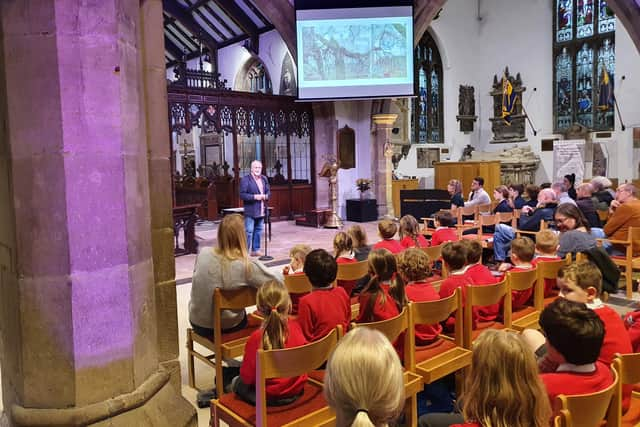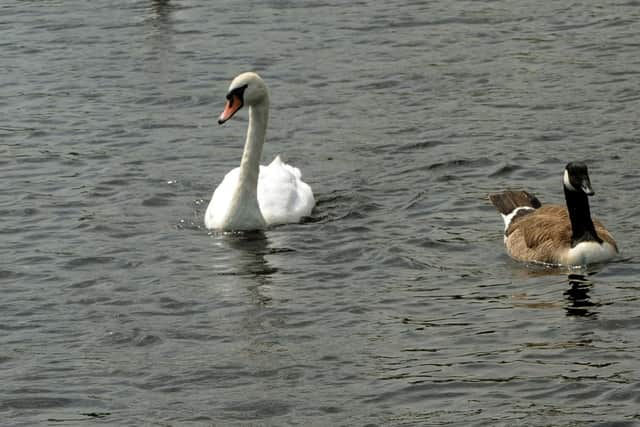How nature recovery plan aims to reverse biodiversity loss in Otley
“Without the natural world, we are nothing,” he told an audience at Otley Parish Church. “You can have all the money in the world, stuffed into your pockets, standing on a bare rock, and it will do you no good whatsoever. We need as many animals and plants around as we can possibly get. For far too long we have treated ourselves as apart from the natural world not a part of the natural world.”
Dr McGavin has written the foreword to the Nature Recovery Plan for Otley, a vision developed by the Otley Nature Network. In it, he says: “That our livelihoods, wellbeing and ultimately our survival depend on the natural world is irrefutable. But we have taken the natural world for granted for far too long and it can no longer meet our demands.
Advertisement
Hide AdAdvertisement
Hide Ad"Our success as a species has come at an enormous cost to the environment and if we continue to plunder and pollute our natural capital, we will find ourselves scratching around for survival on an impoverished planet. Governments might be paralysed into inaction by the scale of the task ahead but, by taking action locally, we can get things moving much more quickly and show that there is a way out of the environmental chaos we have created.”


Around 60 invitees attended the launch event for the nature recovery plan last month. Presentations were made by children from Westgate Primary School and members of an eco-committee at Prince Henry’s Grammar School.
The plan has been developed by a network of organisations including Wildlife Friendly Otley, Wharfedale Naturalists, Yorkshire Rivers Trust and Natural England, brought together by community group Otley 2030, which is working to make Otley “a carbon-zero, sustainable and fair town by the 2030s”.
Chairman Gordon Haycock, who is a principal ecologist at Haycock and Jay Associates in the town, said the network is a way of coordinating the efforts of various wildlife and environmental groups operating in Otley and the lower Wharfedale area.
Advertisement
Hide AdAdvertisement
Hide AdHe hopes the group will be able to work with members of the community, Otley landowners and Leeds City Council to enact the plan, as well as Otley Town Council, which declared a climate emergency in 2019 and a biodiversity emergency earlier this year.


Gordon says: “We don’t underestimate the job at hand but the aim is to have a measurable outcome of halting and reversing biodiversity decline.
"We seem to be happy carrying on doing what we’re doing, knowing at some point our children or our grandchildren are going to have to pick up the pieces,” Gordon continues. “Anything we don’t do now, they will need to make changes at a faster rate and more drastically. So it’s a responsibility to future generations as much as anything else. That’s a big driver for me. We also have a responsibility to our natural environment. That’s what sustains us...We need to start taking care of things.”
Gordon’s interest in the natural environment has shaped both his employment and community work. “An interest in natural history is something I think all children are born with and it’s stuck with me,” he says. “I feel a very deep empathy with the natural world. And in my career over the past 35 years, I have been recording the decline of biodiversity and it’s painful to watch. That spurs me on. We need to do something.”
Advertisement
Hide AdAdvertisement
Hide AdA key principle of the nature recovery plan, which is a vision to 2040, is to make the wildlife habitats of Otley “bigger, better and more joined-up”. The plan sets out, among other things, to tackle the use of pesticides and herbicides, restore habitats, and support people to make their gardens more wildlife-friendly.
Gordon says there are many benefits to biodiversity, including mitigating climate change. “More trees in the town will help with flood resilience, for example. More street trees, at the front of people’s gardens, will provide shading for people in the hot summers and intercept water which would otherwise go straight into the river and cause flooding.
"A biodiverse landscape is more resilient. When things to happen, if there are extreme weather events, it’s more likely to recover more rapidly with less damage. It’s all about creating a better future essentially.”
